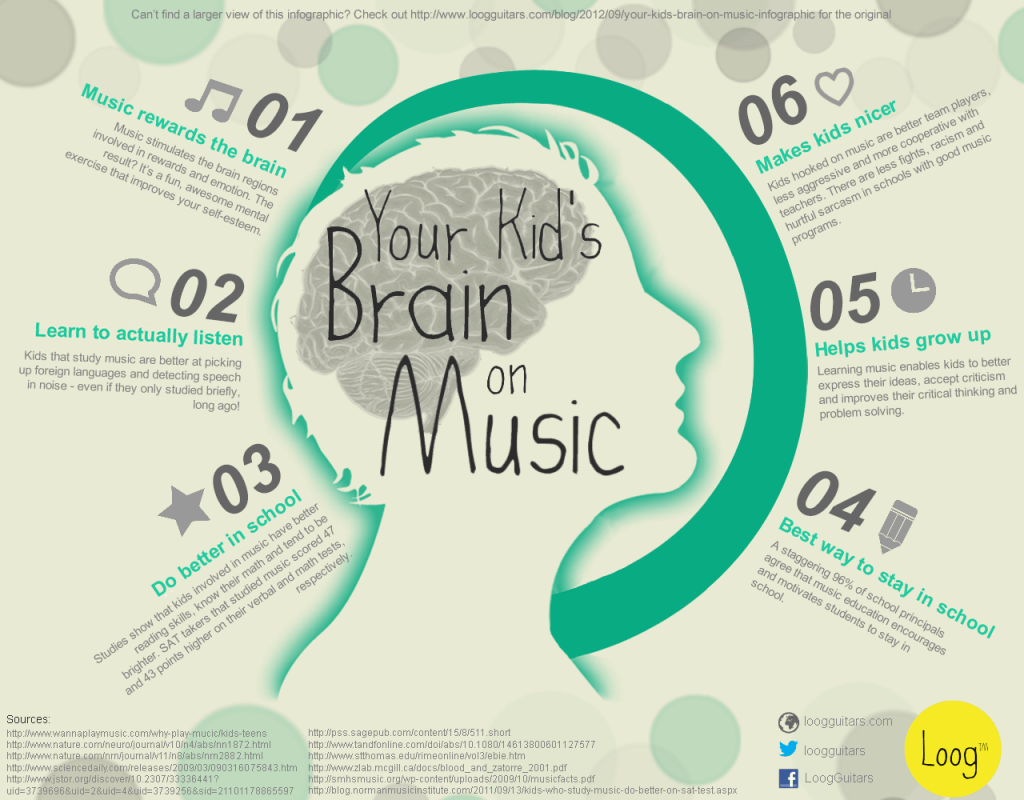You probably know this already―music helps you enjoy what you’re doing, and become better at it. However, scientists and researchers have dissected this belief to the core, and have exciting results to report, straight from the gym. 20 adults were made to participate in 2 interval workouts involving four cycling sprints interspersed with rest periods of 4 minutes each, once with music, and once without it.
The results – participants not only enjoyed the interval training with music but also exercised harder when they had those beats to enjoy. Turns out, this is just the beginning of the magic that music can create. Let’s explore the world of music as a therapy for humans.
Music as an Enabler for Supernormal Academic Achievements
In an extensive medical research carried out by medical experts from Boston Children’s Hospital, findings suggest that early exposure to musical training can help children strengthen their brains’ areas responsible for executive functioning.
Nadine Gaab, senior coordinator for the study, commented on how executive functioning was a better indicator than IQ at judging a student’s prospects of academic brilliance. During the course of the research, it was found that students who underwent at least 2 years of early age music training were more adept at key capabilities like information retention, behavioral regulation, and cognitive control. Check out the study’s published findings to be amazed.

Winter Blues No more – Music’s Here
Winter blues are not just a figment of your imagination; the dull and dreary days of winters can get to your nerves, causing you to feel depressed and out of spirits. Surprise – music to the rescue, again! As per a study published in 2011, in a journal called Nature Neuroscience, people exposed to classical music experienced heightened release of dopamine, a hormone that causes humans to feel happier, in their bodies.
Scientific studies have even identified a few proven effective mood enhancer musical melodies for you to experience the therapy first hand – try out “First Breath After Coma” by Alexander Keats , “New World Symphony—Movement 4,” by Antonin Dvorak, and “Clair de Lune,” by Claude Debussy.
Music as a Gel that Holds Your Brain’s Cognitive Power Blocks Together
Brenda Hanna-Pladdy is an authority in the field of knowledge about music training and its therapeutic influences on the human brain. Pladdy is a clinical neuropsychologist in Emory University School of Medicine’s Department of Neurology, and has explored the salubrious influences of musical education on the ability of the human brain to stay sharper and combat age-linked cognitive declines.
The original study that established the link between music training and brain’s cognitive health was published in Neuropsychology in 2011. Brenda has also documented how musicians who have trained for 10 or more years remain sharp in spite of their growing age and the brain’s natural tendency to undergo decline in cognitive abilities. The second research study by Brenda was features in July issue of Frontiers in Human Neuroscience.

A World with Better Drivers – Powered by Music
In a world where road rage, road accidents, and rash driving are sad and scary realities, it’s surprising how music comes to the rescue. A study conducted in 2013 and published in the ‘Ergonomics’ journal documents how upbeat music helped simulate happiness among drivers. Also, when the terrains and driving conditions became less hospitable, drivers who switched to soothing and mellow tunes were able to concentrate better, and remained calmer than others, which helped them cope up with the challenges of driving.

Substantial improvements were observed in the driving quality parameter scores of drivers who were quick to change the music station playing soothing tunes when driving seemed to be getting tougher and stressful.
Bid Bye-Bye to Pre-Test Anxieties
Anxiety is often the undoing of many students before critical test preparations. It’s one of the recognized blockades to effective learning and a real problem faced by thousands for college and university students across the globe. Massages are a recognized means of stress and anxiety-busting; imagine being able to get a soothing massage before you headed to the library for an all-night study marathon.
Chances are you’d be less anxious and well-oiled for your marathon with the textbooks. A study, as per an article published by USA Today, has established that music is as effective as massage in terms of reducing anxiety levels. The takeaway for students – the next time your tough exams are in sight, tune into some music, or sing a few lines of your favorite songs, and you’re bound to fare better on your academics! Well, perhaps not if you listen to Jay-Z – just kidding!
Featured Image: Image Credit
Music therapy can reduce pain and anxiety, & improve quality of life for people w/dementia https://t.co/kBGQOHvHiE pic.twitter.com/KGyxRvKSkJ
— Harvard Health (@HarvardHealth) February 4, 2016
Sun Ra Plays a Gig at a Mental Hospital; Inspires Patient to Talk for the 1st Time in Years https://t.co/BQJhK9t27F pic.twitter.com/ZBtJ7Aa6my
— Open Culture (@openculture) February 9, 2016
Related Articles:
Music therapy shows promise in treating depression, speech impediments
Since its release in October, Adele’s single “Hello” has been massively successful and while the world took to the Internet to make self-deprecating jokes about the tune’s emotional effect, what were laughs for some might actually be an important healing tool for others. While individuals can easily feel the emotional sway music can carry, according to therapists, that power can be used to treat everything from depression to speech impediments.
Jennifer Buchanan is a Canadian music therapist and the author of “Tune In: A Music Therapy Approach to Life.” Her patients range from a two-month-old with visual impairments to a 106-year-old with Alzheimer’s disease. Via Fox News
What ‘Empire’ Got Right (And Wrong) About Music Therapy
Perhaps one of the most stirring and sympathetic characters in Fox’s hit show “Empire” is Andre, who suffers from Bipolar disorder. In case you’ve been living under a rock for the past three months and haven’t watched the hottest TV show of 2015, here’s a quick recap of Andre’s situation: the oldest son of a music conglomerate CEO vies for power over the company he helped build, but between all the pressure (and betrayal, and violence, and lack of love and support), as well as his attempts to keep a lid on his emotions, Andre eventually flushes his meds down the toilet, precipitating a mental breakdown and entry into an in-patient therapy program. That’s where he meets Michelle White, a lovely and talented music therapist played by Jennifer Hudson. Via Huffington Post
Surgery patients hear benefits of music therapy loud and clear
(CNN)It is no secret the uplifting effect of music, whether you like Mozart or Metallica. A growing amount of evidence also suggests that clinicians can use the power of music to help people recover from surgery and other medical procedures.
Studies have found that listening to music before surgery can reduce anxiety, and may also reduce the need for sedatives. Listening to music after surgery, and even during, may ease pain and the need for pain meds. Hospitals seem to be taking notice. Via CNN

